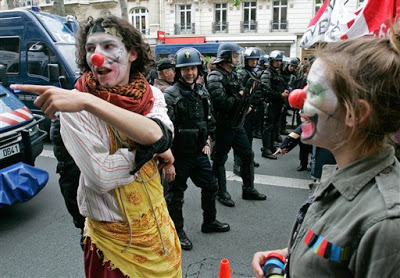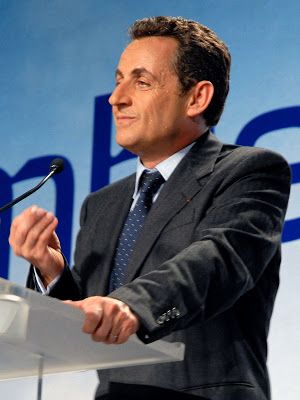
Liberty? Equality? Fraternity?
Is this the Future of France?
On the surface France this summer seems like a relatively tranquil society, but under the surface there are disquieting signs of trouble and unrest. They could easily become more apparent as the global economic crisis deepens.
By Jonah Raskin / The Rag Blog / July 7, 2009
TOULOUSE, France — On July 4 at a Saturday night party near Toulouse, France, a 31-year-old French writer named Julian insisted on telling me his view of France. His English was not perfect, but it was good enough to say what he wanted to say and what he wanted to say was emphatic and unambiguous. “It’s all shit,” he told me. “The future is now and there is no future for us. None at all.”
His is a point of view I have heard before in France over the last 50 or so years that I have visited here. It is a feeling that is especially prevalent now in France and among the young because young people are hard-hit by unemployment and because they detest the government of Sarkozy. Julian’s girl friend, who has a Ph.D. in biology and has been unable find a work, is bitter and resentful.
“The people who get jobs now get them because of family connections and not because they have experience or qualification,” she said. “The corruption is an atrocity.” A few days later at a lunch in Aix-en-Provence I met a middle-aged woman named Isabelle who works for the French National Assembly and who has expertise in the field of labor law. I mentioned the views I had heard on July 4 and asked if they were exceptional. “Many people are angry now in France,” she said. “It is not a good time to be young, to be looking for work and for a future.”
On the surface France this summer seems like a relatively tranquil society, but under the surface there are disquieting signs of trouble and unrest. They could easily become more apparent as the global economic crisis deepens.
France is of course not as large or as populous a country as the United States and its contradictions are not as earth-shaking as those in the U.S. but it is still a country of immense contradictions and those contradictions make France a complex place. Outside every school in France, one sees emblazened the words of the French Revolution, “Liberty, Equality and Fraternity.” And almost everywhere one looks — in schools, in the work place and elsewhere — one sees the absence of “Liberty, Equality, and Fraternity.” The gap between the ideals and the realities can make France seem like a place of pure hypocrisy, especially to the young, and it is not surprising that they have been protesting.
This past spring Paris students went on strike to express their opposition to the Sarkozy government’s plans to make education more accountable to the marketplace. To Julian, to his girlfriend and to many of the young French men and women I have met here, France seems to have already become a corporate society in which old, traditional ways are quickly vanishing. Indeed France feels more and more like everyplace else, with fast food, internet cafes, grafitti, tattoos, and big cars. It is more like the United States now probably than at any other time in its history. Michael Jackson’s death — and his life and his career — have been the biggest news event this summer in France, bigger even than the Tour de France, the famed bicycle race.
But there is another side to the story than the Americanization of France. France is still uniquely French, with its own language, food, culture and traditions, and there are French citizens who still genuinely believe in “Liberty, Equality, Fraternity.” France is very much a part of Europe, determined to go its own way in the world, and to uphold its regional ways and regionalism, from Brittany to Provence. And if the French admire the United States it is often for aspects of America that are not part of mainstream culture such as jazz, film noir and the Beat Generation writers. Moreover, the French have a remarkable ability to absorb cultures from around the world and to retain their own national character. Where else in the world would one find a restaurant; for example named “La Madeline de Proust?” Where else would people get the literary reference?
After a day with Julian in Toulouse visiting libraries, bookstores, churches and an old building that was the headquarters for the Gestapo in World War II — and that now houses the tax office — I apologetically said that I still had illusions about France. The previous day I had visited Albert Camus’s grave. Instead of placing flowers there I picked the flowers of the lavender that were blooming. I allowed myself to think that Camus would have approved of an American — who once thought of himself as an existentialist and who still admired the French existentialistd for their anti-fascism — picking flowers from his grave. Julian looked at me and smiled. “I am glad that someone still has illusions about France,” he said. “Someone has to believe in the France of Camus and Sartre and DeBeauvoir. We’re going to need those beliefs if we’re going to survive the rough times ahead.”
[Jonah Raskin is the author of Field Days and The Mythology of Imperialism.]



















Raskin’s comments are limp with self-referential nostalgia for his youthful encounters with a “France” not so very different from the American versions seen in MGM’s “An American in Paris” or “Funny Face”. One imagines Raskin as Audrey Hepburn dancing to jazz in the the basements of the Left Bank, the ingenue in pursuit of Professor Flostre.
American influence on the French is not exclusively a history of a toxic erosion of la France profonde. Balancing examples of the positive Americanization of France would include the Marshall Plan in the desparate post-WWII years, oh, and yes, the liberation of France from the Nazis. Robert O. Paxton’s studies of Vichy France and its enthusiastic collaboration in the extermination of French Jews helped force France to begin to acknowledge its criminal complicity 25 year late —- with much of the Vichy judicial, military and police apparatus left intact and in place all that time.
The world might thank France for many things—the emancipation of the Jews in 1791 and the ostensible decriminalization of homosexuality with the Code Napoleon.But nearly every “revolutionary” advance in French history has been reversed by savage repression as in the suppression of the Paris Commune in 1871, the Dreyfus Trial or the National Revolution under Petain in 1940/41. French women received the vote only in 1944 by a relatively opportunistic fiat from De Gaulle.
In the national museums of Hanoi one sees the horrific record of French colonialism, not as it is recalled from the distant West, but as it was endured for over a century by the Indochinese population. The years of Camus, Sartre and de Beauvoir’s peak production are also the years of famine and muderous warfare by French armies in Indochina—and colonial Africa.It is the refugees from this post-colonial world living in the bainlieus of Paris and other French cities who are hardest hit by unemployment, police repression and the massive failure to integrate them into the French economy and establishment. The unemployed, highly educated young French people Raskin interviewed in June appear to have been white.